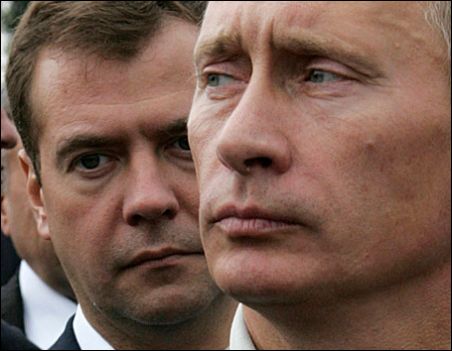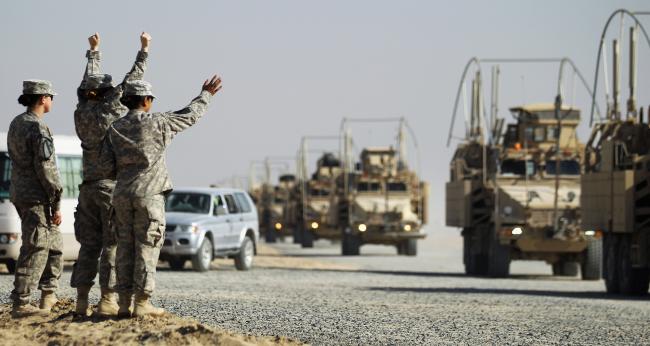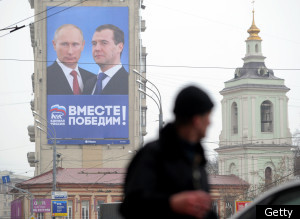Russian President Dmitri Medvedev’s nomination of Prime Minister Vladimir Putin as Russia’s pretender to  the throne and Putin’s promise to keep his friend as premier was hardly a surprise. All along, except to a few starry-eyed liberals, it was clear, that the buck stopped not with Medvedev but Putin. The liberals were given their chance by Russia’s ex-KGB autocrat and failed spectacularly.
the throne and Putin’s promise to keep his friend as premier was hardly a surprise. All along, except to a few starry-eyed liberals, it was clear, that the buck stopped not with Medvedev but Putin. The liberals were given their chance by Russia’s ex-KGB autocrat and failed spectacularly.
Medvedev’s claims to fame have been cosmetic or at best fiddling, starting with the faulty restart button with US President Barack Obama, proceeding through a series of giveaways, – allowing US troop and materiel to transit Russia to Afghanistan, leaving in place various US bases in Russia’s “near abroad”, acceding to the US-sponsored missile defence shield on its borders, and ending with Medvedev’s abstention on UN Resolution 1973 allowing the recolonisation of Libya.
All his talk about domestic reforms and a new European face for Russia proved to be hot air apart from privatisation, which merely handed yet more productive forces into the hands of the elite. His boyish face concealed a schoolboy naivete. The defining moment during Medvedev’s presidency was the Georgian invasion of Ossetia, and it was Putin’s steel fist that showed through as he took control of the situation.
Russians have continued to pack their bags for better pastures during the Medvedev years. Along came the Arab Spring and United Russia suddenly was exposed as a hollow shell, a party of “thieves and swindlers”. Putin risked losing his legacy, as the surge of pride and resolve to build a new Russia was frittered away by the Westernisers, and eclipsed by the dynamism of BRIC colleagues and now the Arabs.
But is a revival of the glory days of Putin’s presidency possible? The prospects for a new Putin presidency are being met with unease in Russian society. Protests on dozens of burning issues, from ecology to traffic, education to health, not to mention corruption, continue, as do terrorist bombings and assassinations.
It’s no wonder that many pine for the good ol’ days of state socialism. The Communists are regaining their respect, as the solutions to Russia’s pressing domestic problems and to its foreign challenges require a genuine spirit of unity. Putin hinted as much with his “United People’s Front” and his talk at the recent United Russia conference about progressive taxation and increased social spending, stealing a page from the Communists’ manual.
That Medvedev is a poor prospect even for PM was confirmed when Finance Minister Alexei Kudrin said he would not work in a Cabinet led by Medvedev and was promptly fired by the president in a fit of peak. It is unlikely that Medvedev will last long in the grinding and thankless job of PM come March 2012.
 The US "withdrawal" from Iraq last year and the planned "withdrawal" from Afghanistan in 2014 cannot help but change the face of Central Asia and the Middle East. But how does Russia fit in, asks Eric Walberg
The US "withdrawal" from Iraq last year and the planned "withdrawal" from Afghanistan in 2014 cannot help but change the face of Central Asia and the Middle East. But how does Russia fit in, asks Eric Walberg 
 All the meticulous plotting to avoid Ukraine’s Orange Revolution
resulted in -- Russia’s very own coloured one. But Russia is not
Ukraine, discovers
All the meticulous plotting to avoid Ukraine’s Orange Revolution
resulted in -- Russia’s very own coloured one. But Russia is not
Ukraine, discovers  Russia’s parliamentary elections have sparked a political crisis, surprising everyone, from President Putin (excuse me, Medvedev) down, including the demonstrators themselves, marvels Eric Walberg
Russia’s parliamentary elections have sparked a political crisis, surprising everyone, from President Putin (excuse me, Medvedev) down, including the demonstrators themselves, marvels Eric Walberg the throne and Putin’s promise to keep his friend as premier was hardly a surprise. All along, except to a few starry-eyed liberals, it was clear, that the buck stopped not with Medvedev but Putin. The liberals were given their chance by Russia’s ex-KGB autocrat and failed spectacularly.
the throne and Putin’s promise to keep his friend as premier was hardly a surprise. All along, except to a few starry-eyed liberals, it was clear, that the buck stopped not with Medvedev but Putin. The liberals were given their chance by Russia’s ex-KGB autocrat and failed spectacularly.



